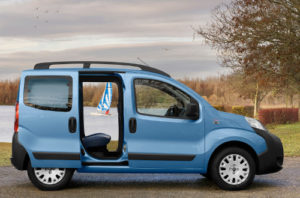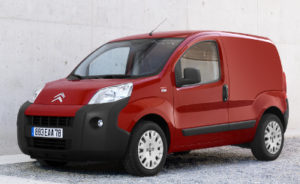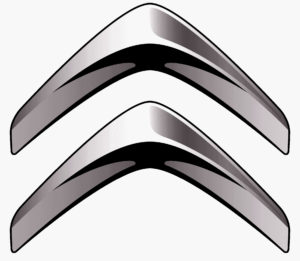The original Berlingo had been such a success in the market that replacing it was never going to be an easy task, so – badge aside – Citroen didn’t directly replace it.
The Mk2 Berlingo is a considerably bigger vehicle than the original, so a smaller van was announced at the same time.
 The Nemo is a joint-venture with Fiat, like the bigger vans, but unlike the Berlingo (which is PSA-only) – but brings a new partner in. Tofaş, a long-standing Turkish licence-builder and partner of Fiat, were involved in the development of the new van, and are the sole builder of all badged versions. The platform used for the Nemo is the Fiat/GM joint-development SCSS platform shared with a variety of small cars, including the Fiat Grande Punto, Alfa Romeo MiTo and Vauxhall/Opel Corsa D. However, the SCSS platform was not a new design, and can trace its lineage through the GM/Fiat Gamma platform back to the GM4200 platform, first seen in 1983 under the Vauxhall Nova.
The Nemo is a joint-venture with Fiat, like the bigger vans, but unlike the Berlingo (which is PSA-only) – but brings a new partner in. Tofaş, a long-standing Turkish licence-builder and partner of Fiat, were involved in the development of the new van, and are the sole builder of all badged versions. The platform used for the Nemo is the Fiat/GM joint-development SCSS platform shared with a variety of small cars, including the Fiat Grande Punto, Alfa Romeo MiTo and Vauxhall/Opel Corsa D. However, the SCSS platform was not a new design, and can trace its lineage through the GM/Fiat Gamma platform back to the GM4200 platform, first seen in 1983 under the Vauxhall Nova.
As with most of the other Sevel vans, the engines vary according to badge – Peugeot Bipper & Citroen Nemo use PSA engines (1.4 TU petrol or 1.4HDi), whilst the Fiat Fiorino uses Fiat engines. Other than that, differences are solely cosmetic.
At the launch of the van, a concept van was shown, playing on the name of the Citroën version and the Disney film, Finding Nemo. Unfortunately, few of the details reached production, but a Multispace people-carrier version was inevitable.
 The Nemo made unfortunate headlines in early 2010, when various consumer organisations loudly proclaimed that without stability control (optional on Fiat-badged diesels), the Nemo was unstable in the high-speed ‘Elk test’ bi-directional S-swerve manouvre made notorious by the original Mercedes A-class, and could easily be rolled. PSA’s response was inevitable – stability control became part of the standard specification on diesels, whilst petrol-engined production was suspended whilst stability control was developed. Little mention, however, was made at the time of the almost direct-opposite situation surrounding the C1/107/Aygo, where ESP-equipped vehicles (almost all Toyota-badged cars) were recalled as part of Toyota’s global throttle-pedal issues, whilst the simpler versions (the vast majority of Citroëns, and most Peugeots) were unaffected.
The Nemo made unfortunate headlines in early 2010, when various consumer organisations loudly proclaimed that without stability control (optional on Fiat-badged diesels), the Nemo was unstable in the high-speed ‘Elk test’ bi-directional S-swerve manouvre made notorious by the original Mercedes A-class, and could easily be rolled. PSA’s response was inevitable – stability control became part of the standard specification on diesels, whilst petrol-engined production was suspended whilst stability control was developed. Little mention, however, was made at the time of the almost direct-opposite situation surrounding the C1/107/Aygo, where ESP-equipped vehicles (almost all Toyota-badged cars) were recalled as part of Toyota’s global throttle-pedal issues, whilst the simpler versions (the vast majority of Citroëns, and most Peugeots) were unaffected.


